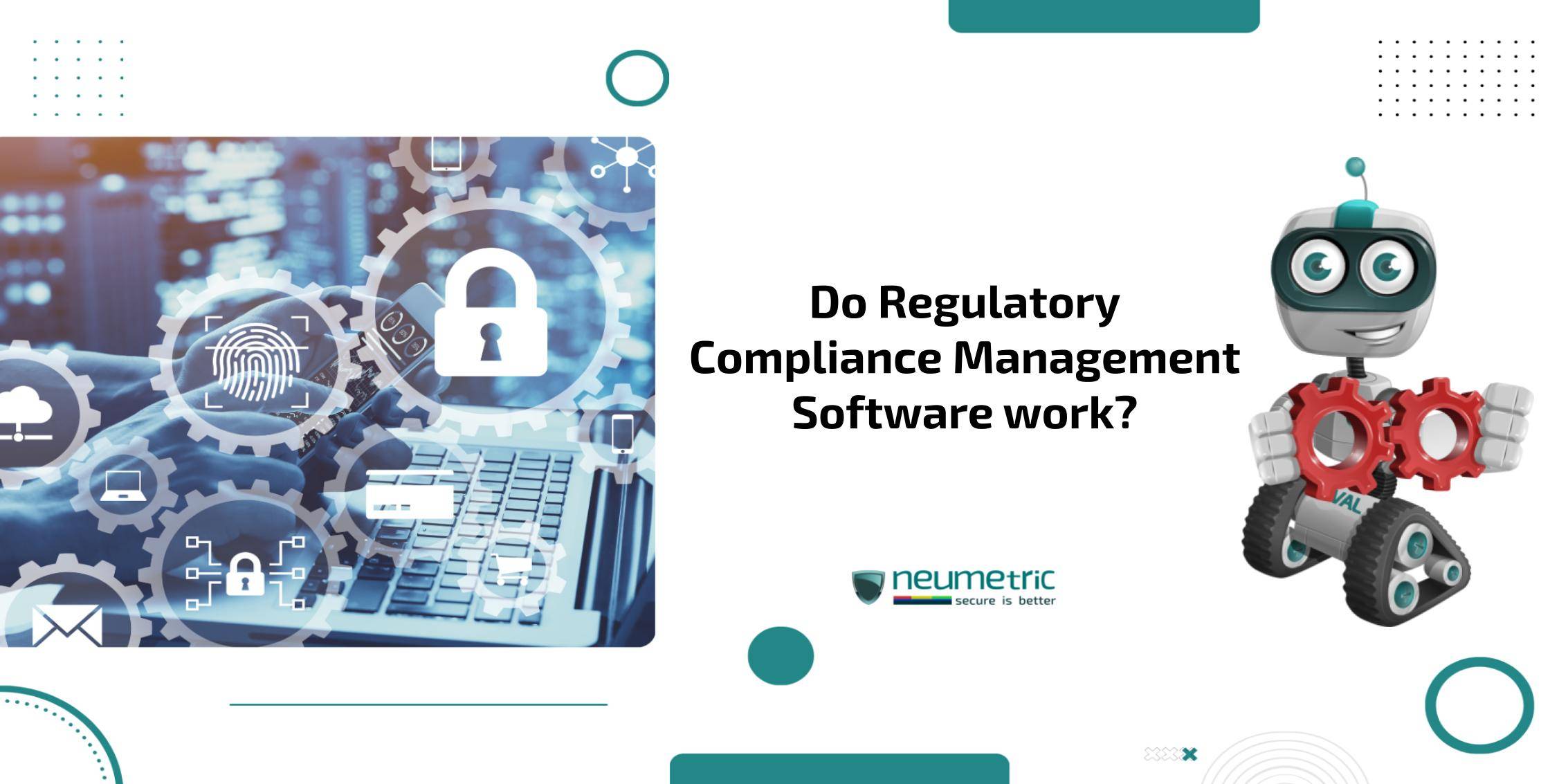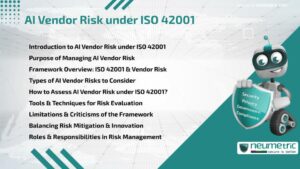Table of Contents
ToggleDo Regulatory Compliance Management Software work?
Introduction
Regulatory Compliance Management Software [RCMS] is a specialized tool designed to assist organizations in managing and adhering to regulatory requirements within their respective industries. It serves as a centralized platform to streamline and automate various compliance-related processes, ensuring that businesses operate within the boundaries of laws, standards & regulations applicable to their operations. This software is tailored to help companies navigate the complex landscape of compliance, covering aspects such as documentation, reporting & risk assessment.
In the dynamic and highly regulated business environment, maintaining compliance is crucial for the long-term success and sustainability of any organization. Regulatory compliance encompasses adherence to laws, industry standards & internal policies, safeguarding businesses from legal consequences, financial penalties & reputational damage. Beyond risk mitigation, compliance fosters transparency, ethical practices & trust among stakeholders. As businesses expand globally and regulatory landscapes evolve, the significance of robust regulatory compliance management becomes increasingly paramount. Regulatory Compliance Management Software emerges as a valuable ally, empowering businesses to navigate the intricacies of compliance seamlessly and efficiently.
Benefits of Regulatory Compliance Management Software [RCMS]
Efficiency and Accuracy
Regulatory Compliance Management Software [RCMS] plays a pivotal role in enhancing the efficiency and accuracy of compliance-related tasks within an organization. By automating manual processes, such as documentation and data entry, Regulatory Compliance Management Software reduces the likelihood of human errors. This not only ensures that compliance requirements are met consistently but also frees up valuable human resources for more strategic and nuanced decision-making. The real-time tracking and monitoring capabilities of RCMS contribute to a proactive approach, enabling businesses to address compliance issues promptly and maintain a continuous state of readiness.
Cost Savings
Implementing Regulatory Compliance Management Software can result in significant cost savings for businesses. The automation of compliance processes reduces the need for extensive manual labor, minimizing the risk of costly errors and non-compliance fines. Moreover, the streamlined workflows provided by RCMS contribute to operational efficiency, optimizing resource allocation. By mitigating the potential financial impact of regulatory violations and promoting a culture of compliance, RCMS becomes a cost-effective investment in the long run, protecting businesses from legal consequences and reputational damage.
Streamlined Compliance Processes
One of the primary advantages of RCMS is its ability to streamline the complex landscape of compliance processes. The software centralizes all relevant compliance information, making it easily accessible and manageable. From documentation to reporting, RCMS provides a unified platform for organizations to track, assess & meet regulatory requirements seamlessly. This consolidation not only simplifies day-to-day operations but also facilitates a comprehensive view of compliance status. As a result, businesses can navigate the intricate web of regulations with greater ease, ensuring that compliance becomes an integral and integrated part of their overall operations.
Common Concerns
Security and Data Privacy
One of the foremost concerns when implementing Regulatory Compliance Management Software [RCMS] is the assurance of security and data privacy. Given the sensitive nature of compliance data, businesses must ensure that the RCMS platform adheres to robust security protocols. Encryption mechanisms, secure authentication processes & compliance with industry-specific data protection standards are crucial aspects. RCMS providers often implement stringent security measures to safeguard against unauthorized access, data breaches & ensure the confidentiality and integrity of the information stored within the system. Addressing these concerns is paramount to fostering trust and confidence among users and stakeholders.
Customization and Scalability
Concerns related to the customization and scalability of RCMS are common among businesses considering adoption. Every organization has unique compliance requirements & a one-size-fits-all approach may not be suitable. Hence, businesses seek assurance that the RCMS can be tailored to their specific needs. Additionally, as businesses grow or face changes in regulatory environments, the scalability of the RCMS becomes vital. The ability of the software to adapt to evolving compliance demands and accommodate increased data volumes without compromising performance is crucial for long-term success. A reputable RCMS provider addresses these concerns by offering customizable solutions that can scale with the organization’s growth.
Integration with Existing Systems
Integrating RCMS with existing systems is a significant concern for businesses to ensure a seamless flow of data across various departments. The fear of disruptions, data inconsistencies or compatibility issues often arises during the integration process. However, a well-designed RCMS is built with interoperability in mind, allowing it to integrate seamlessly with other enterprise systems such as ERP, CRM or document management platforms. This integration not only enhances efficiency by reducing data silos but also provides a holistic view of compliance across the organization. Businesses looking to adopt RCMS should prioritize solutions that offer smooth integration processes, minimizing potential disruptions during implementation.
Evaluating Effectiveness
Measuring ROI
Measuring the Return on Investment [ROI] is a critical aspect of evaluating the effectiveness of Regulatory Compliance Management Software [RCMS]. Businesses invest in RCMS to improve efficiency, reduce risks & enhance overall compliance & assessing the financial impact is key. ROI can be quantified by comparing the cost of implementing and maintaining the RCMS against the tangible benefits achieved. This includes factors such as time savings, reduction in compliance-related errors & potential cost avoidance in terms of fines or penalties. Successful RCMS implementation should demonstrate a positive ROI over time, reaffirming the value of the software in contributing to the organization’s bottom line.
User Feedback and Satisfaction
User feedback and satisfaction are invaluable metrics when gauging the effectiveness of RCMS. The experiences and opinions of those directly interacting with the software provide insights into its usability, functionality & overall impact on daily operations. Positive feedback often indicates that the RCMS aligns with user expectations, facilitates their tasks & contributes to a more streamlined work environment. Conversely, negative feedback may highlight areas of improvement, usability issues or specific features that may need enhancement. Regular surveys, feedback sessions & user forums are effective tools to collect and analyze user sentiments, helping businesses fine-tune their RCMS implementation for optimal user satisfaction and overall effectiveness.
Selecting the Right RCMS
Considerations in Choosing RCMS
When selecting the right Regulatory Compliance Management Software [RCMS], businesses must carefully evaluate various factors to ensure a seamless and effective implementation. Key considerations include:
- Compliance Requirements: Assess specific compliance needs relevant to your industry and geographical locations. The RCMS should align with these requirements to ensure comprehensive coverage.
- Customization Options: Look for RCMS solutions that offer customization to adapt to your organization’s unique processes and compliance workflows. A flexible system allows for tailored configurations to meet specific needs.
- Scalability: Consider the scalability of the RCMS to accommodate the growth of your business and evolving compliance demands. The software should adapt easily to increased data volumes and expanding operational complexities.
- User-Friendly Interface: An intuitive and user-friendly interface is crucial for successful adoption. Employees across various departments should find the RCMS easy to navigate, reducing the learning curve and promoting widespread usage.
- Integration Capabilities: Ensure that the RCMS can seamlessly integrate with existing systems such as ERP, CRM or document management platforms. Smooth integration enhances data flow and provides a unified view of compliance across the organization.
- Security Measures: Prioritize RCMS solutions with robust security features, including encryption, access controls & compliance with data protection standards. Data security is paramount when dealing with sensitive compliance information.
- Vendor Reputation: Research and assess the reputation of RCMS vendors in the market. Consider reviews, case studies & testimonials from other businesses to gauge the effectiveness and reliability of the solution.
Businesses should evaluate these options based on their specific needs, considering the outlined considerations, to select an RCMS that aligns with their compliance objectives and operational requirements.
Conclusion
In summary, the adoption of Regulatory Compliance Management Software [RCMS] offers businesses a streamlined and efficient approach to navigating the complexities of compliance. The key benefits, including enhanced efficiency, cost savings & streamlined processes, underscore the effectiveness of RCMS in bolstering organizational compliance strategies.
In conclusion, businesses are encouraged to explore the transformative potential of RCMS in fortifying their compliance frameworks. As regulatory landscapes evolve, the adaptability and robust features of RCMS become essential tools for maintaining a proactive and resilient stance against compliance challenges. Embrace the power of RCMS to not only meet regulatory requirements but to drive operational excellence and instill confidence in stakeholders.
Make RCMS an integral part of your organizational strategy, empowering your team to navigate the intricate web of compliance seamlessly and ensuring a future-ready approach to regulatory challenges.
Frequently Asked Questions [FAQ]
Why choose Neumetric’s Fusion?
Neumetric’s Fusion offers a plug-and-play platform for compliance management with innovative features, making it stand out in streamlining information security for cloud-native organizations.
How does RCMS save costs for businesses?
RCMS automates compliance processes, reducing manual effort and minimizing the financial impact of regulatory violations, providing a cost-effective solution for long-term compliance readiness.
What should businesses consider when selecting an RCMS?
Businesses should prioritize factors like compliance alignment, customization, scalability, user-friendliness, integration capabilities & vendor reputation when choosing an RCMS for effective compliance management.





